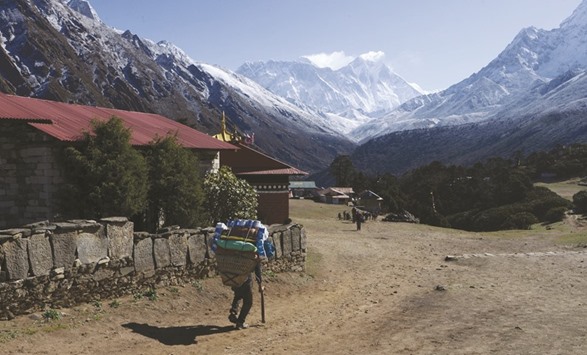Sherpa climbers who successfully scale mountains including Mount Everest will be officially recognised, the Nepal government said yesterday, reversing a controversial decision to stop issuing summit certificates to the guides.
Sherpas who guide foreign mountaineers are the backbone of Nepal’s lucrative high-altitude climbing industry, which nets the impoverished Himalayan country more than $3mn a year.
Last year Nepal announced it would stop issuing summit certificates to the guides and only officially recognise the climbs of foreigners who pay expensive permit fees, which run to $11,000, for permission to scale Everest.
“The ministry is positive on the proposal forwarded by the tourism department to provide certificates to Sherpas,” Ghanshyam Upadhyaya, spokesperson at the ministry of tourism, said.
All Sherpas climbing during the current spring season, which runs from late April to the end of May, will have their climbs retroactively recognised once the law changes, said department of tourism spokesman Durga Dutta Dhakal.
Sherpa guides staged a sit-in earlier this week at Everest base camp to demand their climbs be recognised by the government.
There are 373 foreign climbers currently on the 8,848m (29,030ft) peak who will attempt to summit in the coming weeks with the help of at least one Sherpa guide each.
“The summit certificates count for their (Sherpas’) reputation and credibility,” said Ang Tsering Sherpa, the head of the Nepal Mountaineering Association.
“The recognition is important for everybody. To recognise the efforts of all to reach the summit of these mountains,” he added.
Upadhyaya said that a draft revision would be sent to the finance and law ministries and then the cabinet for final approval - a process that will likely take months.
Nepal has issued a record number of permits to climbers attempting to reach the top of Mount Everest this season .
Some 372 people - the majority of which are foreign climbers - have received permission from Nepal’s Department of Tourism to climb the 8,848m peak in the Himalayas, said senior government officer Durga Dutta Dhakal.
Dhakal said the number, which doesn’t include around 400 local mountain guides, cooks and porters who support expeditions, was the highest in recent years.
A total of 42 expedition teams received permission for this year, he said.
Last year, 34 groups with 289 members had been given permission to climb Everest.
“Most of them had to abandon their attempt after the earthquake in 2015. We had extended the validity of the permits for five years. So they came to take advantage of that,” Dhakal said.
Temba Tsheri Sherpa, an expedition organiser, said a team of 12 climbing Sherpas had fixed ropes up to Camp 4, which is at an elevation of 8000 metres.
“They will leave for the summit early Saturday. They will be the first ones to reach the top in this season,” he said.
While the Everest base camp was windy and snowy, a weather window on the summit was likely to open over the weekend and next week, Sherpa said.
Ueli Steck, a veteran Swiss climber, died near Everest on Sunday, the first fatality of this year’s spring climbing season, which runs between April and May.

A trekker walks in front of the Mount Everest range at Tengboche, some 300kms northeast of Kathmandu, yesterday.
